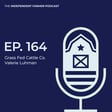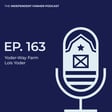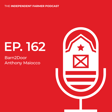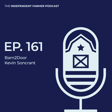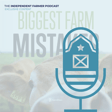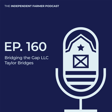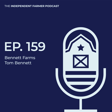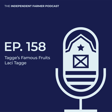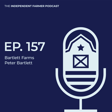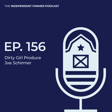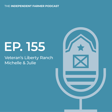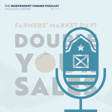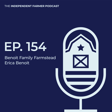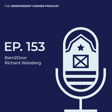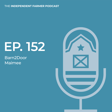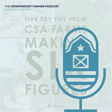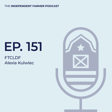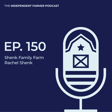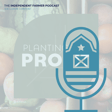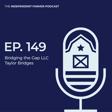Become a Creator today!Start creating today - Share your story with the world!
Start for free
00:00:00
00:00:01

How to Double your CSA Membership with Tagge's Famous Fruit & Veggie Farms
In this week's episode, Barn2Door CEO, Janelle, talks with Laci from Tagge’s Famous Fruit & Veggie Farm to discuss the importance of pricing, packaging, placement, and products for CSA members.
Transcript
Introduction & Podcast Purpose
00:00:03
Speaker
Welcome to the Direct Farm podcast, the go-to resource for farms across the US looking to grow and manage their business. Tune in weekly to hear tips and tactics from our most successful farmers on how to increase sales, access more customers, and save time and money. We'll also speak with industry experts, business leaders, and partners to share the latest farm business trends selling direct to market.
Target Audience & Barn to Door Software
00:00:27
Speaker
Hello and thank you for joining today's podcast, the go-to podcast for independent farmers who simultaneously are running their farm and a business and who aim to sell directly to retail wholesale or both. This podcast is hosted by Barn to door experts on the business side of farming. We are an all in one business solution for farmers, including both software and resources to make it easy to sell in person and online market their brand and manage everything from inventory to finances to delivery.
00:00:55
Speaker
We've been serving independent farmers since 2015, and we're humbled to work with thousands of farms in all 50 states. I'm Janelle, CEO of Barn to Door and your host for today's episode.
Meet Lacey Taggy & Farm Backstory
00:01:06
Speaker
We've got a great conversation for you today with Lacey Taggy from Taggy's famous fruit and veggies farm located in Perry, Utah.
00:01:14
Speaker
Taggis is famous in their community for locally grown fruits and vegetables. A family operated farm business with 134 acres of fruits and veggies, Taggis have become a staple in their local community by building a convenient subscription program, also known as a Community Supported Agriculture, or CSA. They will be discussing how to double your CSA customer base, among other things. Welcome, Lacey.
00:01:38
Speaker
Thanks for having me. First, before we even get started, of course, our listeners want to learn a little bit about you and your farm, then they've got a little bit of context. I understand your father started farming in his mid 30s as a complete career pivot, and really never looked back. Yeah, exactly. So my dad bought the farm when I was in third grade. I'm 33 now. But before he bought the farm, he
00:02:04
Speaker
would take three weeks off of his CPA job and he would go to this Lake town called Bear Lake and buy raspberries. So he would just buy raspberries, probably 100 flats, go down to Salt Lake, which is like an hour south, sell them on the side of the road. He did that alone and then he started dating my mom. My mom would do it. Why they're dating, go get raspberries.
00:02:23
Speaker
They'd have a little competition and then they got married, but they did that very business for probably about 15 years. So they started that way. And then my mom was like, Hey, peaches are famous in Brigham city. So get some peaches on your way up, bring them down. And the peaches sold faster than the raspberries. So my dad kept buying these peaches from a farmer and the farmer said, Hey, I'm done by my land. Start off with 30 acres, buy my little fruit stand. I'll teach you for a year.
00:02:51
Speaker
how to farm. So my dad, yep, stops a job and he went for it. I love that raspberry. You were like the gateway drug to farming. He's
Family Roles & Transition to Full-time Farming
00:03:03
Speaker
awesome. He also has this broker's life and he's flipped about 15 homes. My dad has, he does the Jacksonville trades. He's done everything. So it's great. Well, it sounds like he has a lot of help on the farm. So he can do all the things on and off the farm. Who works on the farm? Yeah, of course, my mom, Carrie, his wife,
00:03:22
Speaker
She does all the loose ends, tied the bows, makes it pretty. And then I, their daughter, I'm the youngest of four and I've been full-time for 12 years, but of course I started working when they bought the farm and we had to work Saturdays and stuff, but I've really dived into it 12 years ago and I own my own Blackberry land and stuff like that. Oh, awesome. Yeah. I love that. And are your other siblings involved as well? Or are you picking up the pace? I'm just the only one. Yeah.
00:03:52
Speaker
Well, lucky them and lucky you. That's fantastic. Yeah, it's fun. I really enjoy it. I have recruited my husband. He quit corporate last year. So this was his second year being full time farm. So we're just playing that by ear. See if he likes it or not.
00:04:08
Speaker
Oh, that is fun and fantastic. I'm very happy to hear that.
Understanding CSA & Farm Box Subscription
00:04:12
Speaker
And then would you say you're very known for CSA, which you sometimes also call a farm box, right? Yeah, so you know, CSA is such a weird terminology. No one knows what that means, right? Of course, it's a nationwide kind of CSA. So we kind of made it towards like a farm box subscription, it makes more sense to people. We use both words. So people that do move to Utah,
00:04:34
Speaker
that have done a CSA know it, but the farm box is such better wording, you know, it's, it's just simple. So yeah, we have a little farm box and we do policy of faith. It's funny, a lot of people don't appreciate that CSA, it's a bit of a leftover term from years and years ago, decades actually, I think at this point, where it was community supported agriculture. And that was like people paying in early into a farm's produce season and then riding it out with them, right?
00:05:01
Speaker
Yes. Yeah. So we do still follow that concept. So here in Utah, we have a short season. Ours is just 15 weeks. We start the first week of July and they do get a better pricing if they pay up front. So most of our payments are coming in from January to April and it is a commitment. They do need to commit for the whole 15 weeks with us. Then they do the whole subscription, but we are nice. We do let them have two vacation holes and a little makeup box. So if that does help us get more members.
00:05:30
Speaker
That makes a ton of sense because you're kind of partnering with your farmer, which I love. Yes. Yeah. And then we get to know how much we can plan for stuff like that. So people can buy, you're saying January through March. So they're buying way ahead of the season. Yes. Yeah. So a lot of our signups come in in January, the people that have been with us. And then what I'm starting to do in March and April, May is I'm doing advertising and collaborating and
00:05:58
Speaker
having my members find friends to join and stuff like that. Got it. So you're just ongoing marketing and signups from the get-go from the beginning of the year, all the way up to your 15 weeks. Wow. That's great. Do you sell other products outside of CSA, the subscription farm box? Yeah. So we do a lot of jams, salt, sizzles, and syrups. We have a kitchen. We have a lot of add-ons that they can add onto the CSAs.
00:06:23
Speaker
throughout the season. So we have a honey, share eggs, corn, extra produce, all those add-ons, jam and salsa add-ons. So yeah, we always include those too. Of course we do go to fruit stands and farmer's markets. We have eight fruit stands and we go to about 15 farmer's markets, but the CSA is unique. They're with us. They get a better pricing. They're our best friends. They're a number priority.
00:06:45
Speaker
their priority to our farms. Yeah. Sounds like customer loyalty. And then they get the love because of that. So your farmer market seasons are probably longer than the CSA. Is that fair to say? They start first of June. So they're about a month, four weeks longer.
00:07:00
Speaker
So I know there's a lot of farmers that sign up for Brontador for a variety of reasons.
Benefits of Barn to Door & Technology in Farming
00:07:05
Speaker
But one of the common things we hear is how much time it saves. And I think sometimes farmers are even a little surprised about that, especially as a farmer is growing and has more and more customers and more and more orders.
00:07:18
Speaker
So then somehow the administrative work, or like you're saying, probably all the loose ends becomes too much. And if it's all done manually, then A it's taking up a ton of time, but B then you kind of are scared that you're missing things. And my understanding if I'm correct, is that's a bit of what was your impetus or reason to sign up for Barnes door. Cause you guys were just getting bigger and you were seeing time used on things that maybe didn't need to be used on. Yeah.
00:07:45
Speaker
So yeah, this is the number one reason why we went to Barnador because we would do it all through our website and then handily meant manually enter everything into Excel. And it was hours and hours. And my mom would be on the computer to at least four hours a day. She would be on, she said from like 5 a.m. to seven and then at night from like seven to nine. So we're already saving her four hours because also what we do is add-ons before we had Barnador, we would offer things.
00:08:15
Speaker
And people would email us in, they memo or write a check. And then we'd have to enter that into Excel, do a label. So it was just a lot of, a lot of work. It's amazing how much time we have saved. It's I can't even, it's just, we can add more, we can make more money because we have.
00:08:34
Speaker
the add-on options now and it's just it's such a smoother process. God bless your mother because my grandfather's a dairy farmer so he was always up at the crack of dawn so I get it but hello if you have a big produce operation crack of dawn just for the administrative work alone.
00:08:50
Speaker
So four hours a day, please tell me it's reduced significantly since you guys have a software tool in place. Yeah. So I'm doing it in my assistant and my assistant works four hours a week. So it's not, it's compared to four hours a day. Yeah, she's doing it. She's just adding on new items and doing a Mailchimp and that's all. And then it comes in and I just pull the pack list, the pack list to create my labels for a thousand boxes. It's probably 30 minutes.
00:09:17
Speaker
So it's, it's amazing. Okay. That's 24 hours of saving. Let's just enjoy. Oh, that's great. Because then people can just order on their own anytime and you're not having to manually grab that order.
00:09:29
Speaker
every single time it comes in and put it on and those sorts of things. That's the beauty of, people maybe don't realize the beauty of technology is first of all, people can just order any time that they want and then you don't have to track it. It's just going to be tracked. Yeah. A good example of that is someone would see the extra corn when they pick up their box and they're like, Oh, I want the extra corn. So then they'll just go on the website, order it right then. I don't have to worry about that. Yeah.
00:09:53
Speaker
So they would see these add-ons and these extra subscriptions we'd add, and then they would just go buy it. So it was amazing. I think it's the difference between a brain exploding from too many details. After my first week of the box was going out, everyone wanted the microgreens. So they saw the microgreen subscription and they're like, crap, I need it. So I got like another a hundred signups for that after the first time. Amazing.
00:10:15
Speaker
That's awesome. That's great to hear. And then delivery day before it sounds like you were doing a lot of Excel management of orders manually to do delivery day. What's different now from delivery day? Is it a little bit easier? Because I know I would say that.
00:10:31
Speaker
A lot of the firms, I don't know if you agree, but one of their favorite features are the pick and pack lists. Yes. So nice. That morning I'm picking out a hundred flats of raspberries and 20 raspberry jam. I just have a master list. I can prep it the day before on those stuff. And then, yeah, it's just so much easier. Yeah. My pick and pass list saves me for especially add-ons. I can the week before I have my special box of peaches. And then I know I need to have 200 ready.
00:10:59
Speaker
So it's just amazing. Yeah. That's awesome. And it's very real time. And then collecting payments, is that also easier? Yeah. So we do still do the cash option and that is a little trickier, but I have my assistant, she's on that and it's all the old timers that want to write a check or Venmo, but mostly the credit card. It's smooth. Yeah. It's interesting you say that because when we were building the software.
00:11:24
Speaker
for Brontador for farmers to have that online store we're like hey there's going to be people who still want to pay cash and check including to your point old timers a lot of younger folks don't even own a checkbook right they're just like a check what and they're like what like carry cash they couldn't be bothered and i mean that in the nicest way but it's really nice for farmers to have the options to give all the customers right so
00:11:47
Speaker
Anything from cash check all the way to digital to subscriptions or pay up front. Any of the options to make it almost like the customer preference, but then you as a farmer get to choose which ones you like too. Yeah. Cause yeah, I've had members with me for five or six years and they love adding the check.
00:12:04
Speaker
As long as you're getting paid, right? That's awesome. Good. Well, good to hear that. So your CSA membership, if I'm correct, has almost doubled in the last two years, which is quite remarkable. What's the secret?
Strategies for Growth & Customer Engagement
00:12:19
Speaker
The secret is it's more manageable, especially with barn to door that.
00:12:24
Speaker
the number one thing, we're able to have not a limit on it anymore. Just because it was stressful hearing my mom be on the computer for four hours a day, you know, so she was like, I only want 500, you know, so obviously barn to door has helped with managing that stress, but our secret is a couple things. So first I offer a discount code to my previous members to sign up for the next year. So they get a little off.
00:12:48
Speaker
And then the second one is I offer them more store credit. If they post on their social media next door, I offer them like 10 to $40 if they post. So it's word of mouth, you know, it's kind of the next thing. And then the third one is I have done collaboration with influencers. They'll post about my box and I'll give them a box. So do stories every week, stuff like that. So that's like kind of my third is collaborating with local foodies, people that like to cook and recipes and blogs and
00:13:17
Speaker
Moms that cook for big families. Like that's kind of my request phrase. Those are the people I'm reaching out to you. Yeah, they're, they're helping, educating people how to cook, how to eat local cook, seasoning. So those are kind of my people that help me out. And I have about four or five cute little ladies that just make recipes for me every week. They love it. And they have a garden themselves that they're home people to you and they love it.
00:13:43
Speaker
really passionate about food, helping with recipes and posting on social and whatnot. They are local. They're like living where you're delivering is my understanding.
00:13:51
Speaker
Yes, we are. That's awesome. That's really, I mean, that's helpful. It would make the most sense, I suspect. And then tell me if I'm wrong, but at some point along the way, you did two things as well. Because my understanding is like, there's a lot you can do when, like your mom, she gets like, I can handle up to 500 customers and otherwise I'm going to explode because the manual process, we call that the humans don't scale. And then that's when you start to say, well, let's let the calculator do it. You know, like let's technology.
00:14:19
Speaker
help with some of the administrative organization pieces that you can then walk away from hopefully and then get some time back. I'm in truly scale because you have to actually streamline processes, right? You have to actually be like, how can I save time on some of these heavy manual things? And I think, didn't you move from customer's choice to farmer's choice too?
00:14:41
Speaker
We've always just been, we choose, you get what you get. So we've never done picking each item. I don't know how people do that. You've never done custom boxes. You've always done farmer's choice. I know some farmers out there who are probably jealous of that, to be honest.
00:14:54
Speaker
Yes. I don't know how they do it. And I can't. You get what you get. And yes, maybe get an eggplant. Give it to your friend. Give it to your neighbor. It's OK. Especially if you want to manage. So this year we had 1,000. There's a few customers we have that say no garlic, no onions. And we're able to manage that. But I've talked to quite a few farms lately of going from hobby to full time or growing or doubling your CSA. And they're like, you have to go to farmer's choice. You get what you get. Because you can't. If you want to scale.
00:15:23
Speaker
Yeah, and his take on it was actually like, I'll mess it up. There's too many things to keep track of, and then you'll be unhappy. And that's terrible, right? We want happy customers. And I think the way that you handled it is brilliant, which is add-ons. Like, you're like, here's your base. But then there's add-ons, right? I feel like that's where you're like, here, have at it.
00:15:44
Speaker
So one thing that's unique with us, we used to have just a big box. It would be four to six people. And our biggest complaint is we were too generous, which is a great complaint. So then we came up with this little one person box and a two person box. So we have a one, two and a four person box and say those one person love corn.
00:16:02
Speaker
they'll get the one person box and then they'll add on six extra ears of corn a week and so they can get more corn or more peaches so then they can pick more what they want but they get the original box
00:16:14
Speaker
get the week of what we grow and then, oh, there's more cherries I can add on. Oh, I'll add on cherries and I'll add on cord. So it's really, if they want to be customized kind of like that, they have to just buy it and do that on. So it works out really great because our biggest complaint is we're generous. So we had to do smaller sizes. That's why we weren't getting people back is it was just too much. So then I still have that big box for those people, those family, but then I have a little one person.
00:16:40
Speaker
The two person actually is my most popular. I had 500 of those this year. And it's great. They get about two of everything. And then if they want more of anything, they add it on. So it's worked out great. I love that because first of all, hey, if it was me, I would get one. I would probably get size medium and then add on when I knew I could do some canning. Or like, hey, this is the week that I'm going to focus on freezing corn. And then the next week's like, great. I know I have my Saturday cut out to like process a gazillion peaches or whatever.
00:17:10
Speaker
I would love that. And then you're still getting farm fresh goodness every single week, but the right size. So the size is a big deal. I feel like you definitely figured that out along the way and it expanded the number of customers. Talk about doubling your CSA.
CSA Box Sizes & Marketing Strategies
00:17:25
Speaker
Would you say that offering three different distinct CSA or farm box sizes made it more interesting to more customers?
00:17:35
Speaker
A hundred percent. Yeah. Cause people just want to, they want to support local, but they don't really necessarily want this six to $800 box. So I have that $300 range that one person bought. They can try their best to cook local. They can try to use it all. It's not as overwhelming. And then if they're comfortable, they can bump up or they can just stay at the one they're still supporting their family and they're not feeling so overwhelmed.
00:17:59
Speaker
So that helped a lot having that one person, you know, there's a lot of people that are single and they don't have this roommate to share with. So it's worked out great. It's helped us have more boxes for sure. And then again, I know it's farms choice, but I still am letting them have three different size choices, but it's easier to pull on that pack list. Like I got 300, one person, I got 500, two person, and we know what to pack. That's amazing. And hello. They still get to add on whatever they want every single week, which is lovely.
00:18:29
Speaker
It's interesting you say that because we often, do we also work with farms who sell quarters, halves, wholes of cows, or they'll sell half whole hog, et cetera. And oftentimes if they expand the offering to include a farmer's choice bundle box, and oftentimes they'll do five pound, 10 pounds, 20 pounds, they find that so many more people buy it. And I think to your point, you mentioned before, there's actually a lot more single family households or couples.
00:18:58
Speaker
When I grew up, we always had a quarter cow, half cow in the freezer, in the garage, right? But that's not everybody anymore. And so if you do offer sizes for different size households, that's really powerful. Expand the number of customers who will buy from you. Yeah. And the big box, our 4% are my people that do freeze and you know, they do look at more of that longevity and the one person's just want to eat it that week and move on. Try something different. I love that.
00:19:28
Speaker
Awesome. And then I know you're going to have tons of advice, but I want to make sure that we capture some really good stuff for the CSA listeners out there or Farmbox listeners, whatever you want to call it. And I thought one fun way to do that would be to quickly ask you questions on the four P's of marketing.
00:19:45
Speaker
So this is me going way back to my whatever business school days of what are the four piece of marketing? And so just for the sake of fun in our audience, these are things you consider when you're doing marketing and as you're all running your farm business, you are selling direct so marketing is a piece of it, right? So you're thinking about pricing, you're thinking about packaging, you're thinking about placement, and you're thinking about product or product mix.
00:20:07
Speaker
And so let's run through these that way, since you've done such a great job and you guys are such a huge household name and you've doubled your CSA and you're crushing it. Let me just brag for you. Cause I know you won't do it for yourself. But that's great. Cause then let's, let's find out what you're doing in the guts of marketing. So from a pricing perspective, how did you figure that out? And I also PS love that you have delivery fees, but tell us a little bit about just the pricing, how you think of it in general, and you can be very high level.
00:20:36
Speaker
Yeah. So pricing. So since we have fruit stands and farmers markets, we want the CSA customers to be welcome and love, right? So they do get a better pricing than if you went to my fruit stand. So let's use my four person example. If you got my four person box and went to my fruit stand, it would be double automatically be doubled. Yes. You don't get to pick out everything in the four person box, but you do save. Yeah. You do save about half.
00:21:05
Speaker
about. And then the other thing is, cause you also are paying up for it. We want that price to be fair week by week. And so that kind of helped out picking the price as well. Makes me want to move to Utah, just so I can get good pricing on your CSA. Yeah. And there's been multiple times where I'll go to the four person, I'll go to the grocery store. I'll fill up what we put in and it's always half. It really is. And people don't realize that unless they really go out there.
00:21:33
Speaker
and pricing it out, but it is half of what you get at the store or at our standard firmless market. And then you do offer delivery, which is actually one of the different questions in the P's, but you also include delivery fees. So let's just cover the fee part of it. So if someone wants it just dropped off at their house.
00:21:51
Speaker
It is an extra $15 a week. That's the minimum kind of base it off the wage. I do have 60 drop off where people offer their houses and that's free. So they'll just go to a house. So my house is a pickup. They'll come Thursday from four to six, pick it up. It's no cost extra. But there are some people that are doctors busy. They just want it dropped off at their office, at their house, and they just pay the extra 15 a week and it's right there. So I have both options.
00:22:17
Speaker
I appreciate that. And actually that's one of the other piece, which is placement, which is where and how do people get your product? Like, how do they notice them and how are they getting there? You know, how and where. So that was part of it, offering pickups and deliveries. And it sounds to me like your pickups are incredibly convenient all over. We're up from Logan, which is Utah, you know, so about, yeah, it's a two an hour north from where we're at and an hour south. So it's a lot, we have a lot.
00:22:44
Speaker
A lot of that doesn't matter where you're at. You can go, you can get it and you can pick it up at a house and it's really convenient. So you have essentially partnerships. You have hosts all over the place. And then if it's me and I'm living there, it's in my neighborhood for pickup.
00:22:59
Speaker
I don't have to pay a fee. I might be driving on the way home from picking up the kids from school. Great for the kids to see, frankly. Yeah. They love that. Yeah. The kids, actually kids is when you go there, they love it. It's like Christmas every week. They're excited to learn what's new and stuff like that. But yeah, with these pickups, these people have been with me, they offer their house. And sometimes if I don't have a location, I just put TBA and people offer their houses.
00:23:22
Speaker
It's convenient for them to offer their house, which is right on their porch delivery. Yeah. So they love it. And then my fruit stands are pickups too. So I got nine that helps. Um, so that takes off a little bit. And then we don't do farmer's market pickups cause they're just all over the place and they don't land on CSA days. So we just do our fruit stand. So yeah, that's what's made us so successful is you can get it anywhere.
00:23:45
Speaker
There's no excuses. I have heard that many times from successful farms. I'm not even kidding. They're like, I have made it so convenient for you to get this farm food. There's no excuses left. And I actually love that because again, people do love convenience, but if it's right there and including because you offer a door to door delivery, like I admit I would be a person who would pay for delivery. Also because my schedules might be wonky and I can't count on that consistently. I will all day long pay for
00:24:14
Speaker
delivery fee. I had about 40 that did the home delivery this year and they were all my busy people. They're actually my people that do like to add on a lot too. They're my bulk orders and they're doctors, they're people that want to share it, want to give out and so they're my ones that are the biggest add-on people too and they really are of that focus, local oriented people and I made it convenient for them. So I wish I could have that delivery fee even lower but
00:24:42
Speaker
the 15 is just what it is nowadays. No, I think people are used to that. It sounds to me like you're not getting very much pushback there and they have nearby pickup options. So if for some reason that doesn't work for them, they have two options. What I love about that is again, with it in mind that you've doubled your CSA because you've expanded with different packaging sizes, special pricing for your loyal customers,
00:25:07
Speaker
I feel like you did the same thing by offering a lot of pickup, but also delivery options because maybe those very busy, like you mentioned, doctors or whatnot, couldn't ever do the pickup. But because you opened up that option, including with a fee, so it worked for you, they're like, yeah, I'm in. So you've opened up even more customers who can buy from you.
00:25:27
Speaker
All right, I have a couple more questions before we wrap up here. So we did pricing, we talked about placement, which is sort of that convenience, like how can I get your food? We talked before about the third P packaging. We talked before about small, medium, large size boxes. When you're thinking packaging, do you do a lot of branding? Do you include a recipe? What are you doing from, hey, this is our brand connecting with my customers when you're delivering those boxes?
00:25:53
Speaker
Yeah so the first and the last week I do a thank you card I put in the box and then each of my box are very customized. That has been a great question I've been thinking about this past year. We've been doing Mailchimp for recipes and stuff like that but some people are missing them so this next year has been a goal of mine. I want to include like a physical recipe card so say there's eggplant in that week I want to have an eggplant recipe card for them they could keep it
00:26:19
Speaker
So then they could connect a little bit more with us. I do feel like I kind of lost some people throughout the 15 weeks by not having a little bit more like a personal note or something inside. Because MailChimp is great and we do what's on the farm, what's in the box, recipes, we do our add-ons. But I feel like I do, I'm missing some people and I want to connect a little bit more. And I think that next step is including in
00:26:45
Speaker
something in the box with like a recipe people love the recipe so like a little recipe card yeah that would be so cute and with your logo right like with your logo with your branding with the website yep go check out our add-on if you want more eggplant go add them on for next week or whatever because you tried the recipe and loved it oh good there's more next week for you to add on yeah buy more eggplants there you go you can never have too much eggplant right i love that okay another compliment to you because
00:27:11
Speaker
the fact that you're just paying attention to your customers and their buying behavior and hey, you know what, I think this will make a difference. And whether that's word of mouth or what you're paying attention to, but you're like, hey, let's do this thing here because that's going to improve customer loyalty, retention, sales, etc. And I think it's awesome that you keep paying attention to
Local Partnerships & Customer Loyalty
00:27:31
Speaker
that.
00:27:31
Speaker
The fourth P is product. Product mix is a consideration because if you just offer one thing, they're just going to buy the one thing. But if you're offering three or four or five different things that are different and unique, they're going to buy more. The amount that they buy from you each week is going to go up, et cetera, et cetera. And so I understand your boxes have a good base and then you have a lot of add-ons that they can choose from. When you're thinking about your product mix each and every year, are there a couple of products that you're like, I'm doing this every year?
00:28:00
Speaker
Or how do you think about the mixture of things that you're giving them? It's variety for sure. So a lot of people want other stuff like baked goods, love stuff made out of our raspberries and peaches. So I'll offer a peach pie. So I have a baker who'll make peach pie for me and then stuff like that. People love where I'm incorporating other businesses with our product. This year, one lady made like a peach butter.
00:28:26
Speaker
out of our peaches. I have the peach pies always. My friend makes some peach cinnamon rolls. She's a cinnamon roll baker. So she'll make our peaches like people love that and they love that I can advertise another little small farm or even a small little baker and it's been really good. It is a lot more work on my end but
00:28:48
Speaker
I get it. It's hard getting out there, but people, these are my, my customers love supporting local and they want to know the connections we make. And so it's just been fun. The community I'm able to bring into my program is really fun and it's exciting. You get your fruit and veggie box, but then you have this amazing peach pie on the top. I think they would just feel loved, right? Yeah.
00:29:11
Speaker
Yeah, it's so fun. This year I focused on adding more of our fruits and veggies on. So I never really offered like six jalapenos. You can add it on. I never done that in the past, but this year I did more focus of that and it was really, really successful. Cause I don't do jalapenos every week. So people do want jalapenos every week or they do want more nectarines or plums or something. But this year I focused a lot on that and it was really, really successful. But the year before I had a new business every week.
00:29:40
Speaker
with add-ons and it was fun too. I just like to switch it up every year because half of my clientele, they've been with me for years and years and they love it. I would be like, who are you highlighting this week and who do I get to buy from? It's almost neat that it's varied, right? I think there's obviously a lot of consistency and seasonality and everything else, but the fact that there's always something new and exciting is marketer's dream, frankly. Yeah. And this year I also incorporated a lot of like challenges.
00:30:10
Speaker
to a post about me more and I was able to give out gifts and stuff and yeah, so it was good. Switch it up every year. I'm hoping that because it's less time spent on orders and logistics that you get more time to be creative and think about marketing and engaging with your customers and expanding on all of those things. That's pretty fantastic.
00:30:31
Speaker
I have two final questions. One, just because you said, Hey, I'm doing this to go into my next season. What are you thinking about? Cause clearly you think a lot about marketing, expanding your customer base and who wants to buy from you. What are you doing in this off season or what might you do differently going into next year? Yeah. So I already have recipes, right? I've done this 15 years. We got 15 years of recipes already just ready, but.
00:30:59
Speaker
People do get overwhelmed. So I'm trying to think of people why they don't sign up the next year. And their biggest challenge is, yeah, you got to cook. You need to experiment with some of the stuff that we have. And some people also aren't looking on Mailchimp. They aren't getting the ideas. So I want something in the box to help them get excited to get the box and they're wanting to cook more and then they realize the difference of, Oh, I was eating fresh peaches when I did taggies last year.
00:31:27
Speaker
when I did this box. So I love to incorporate a peach recipe in there. When they get all these peaches, they're like, yes, I have this recipe. And then it may be like, oh, I don't want to do this recipe. I want to do this recipe. So then it encourages cooking and eating fresh. And then your family loves it. The joy of eating local and then also eating healthier. So that's how I'm going to incorporate next year is giving them a recipe card in the box. I know it's going to cost a little bit, and it's going to keep a little bit more prepping to do.
00:31:57
Speaker
Four or five months, maybe find cost low, get cards ready to go. Then this week is I got my eggplant this week. Okay. Here's the cards. Let's put them in. And then on the card, I can write more. I can tell them about going on the website, stuff like that. Add-ons. I love it.
00:32:13
Speaker
That's great. Thank you for that advice. And then the last thing is if there's somebody who is like, Hey, I want to double or they're just getting started with their CSA program. And they were like, Hey, Lacey, give me some advice on what I need to do first now that I'm just getting started or I'm a hobby farm. I want to grow this. I want to become a full-time farmer. Do you have a piece of advice or two for that farmer? Yeah. Just get started. We started off with 50 to a hundred boxes.
00:32:42
Speaker
And we just got going. It's hard. Everything's hard. You got to cheat your heart. Going to farmers markets is hard. Going to fruit stands hard, but you just got to get out there and get going. Come up with the price, go for it. You're going to learn a lot your first year, and then you're going to grow from that. Just start with what you're good at. So we're really good at peaches. When we put a lot of peaches in, we got these customers with peaches, got them hooked. And then we learned how to grow tomatoes the next year. You know, you just got to.
00:33:08
Speaker
Just experiment and build. So that's my best advice. Don't compare yourself to me as a thousand subscription or like this is 15 years and I've been, my parents really could only handle 500. I was able to jump in and double that. And especially it was able to double it because of barn to door. I was able to get some revenue more in my add-ons and get more money come in. So then we can have those 60 locations. We have more cars, more fleet. It's hard.
00:33:36
Speaker
CSA is, though, about 40% of our business.
00:33:40
Speaker
It helps us sell more. And also if we're overwhelmed, sometimes we have 40,000 peach boxes that we need to get rid of. And my CSI customers get a lot of peaches. So it is, I don't take off the stress of that. That's great. Thank you for that. I love, especially that you're like, it's hard. That's the reality of it, but you can do it. And I love the start with what you're good at and just be good at that and then build from there. That's actually really great piece of advice to wrap this up on. Thank you so much for your time.
00:34:10
Speaker
I want to extend my thanks to Lacey for joining us on this week's episode of the Farm Podcast at Barn Tador. We're humbled to support thousands of farms across all 50 states, including farms like Taggy's Famous Fruit and Veggie's Farm. We're honored to learn from our most successful farmers who share the tactics, resources, and tools they use to grow and manage their farm business, including doubling CSAs in two years, which is miraculous.
00:34:33
Speaker
For more information about Bar and Tador, you can always check out our website at www.barandtador.com. There's also tons of free resources there for farms everywhere trying to run a successful business and we're happy to help. Please check us out. Thank you for tuning in and we'll talk to you next time.
00:34:53
Speaker
Thanks for tuning in. For more free farm resources, tips, and tactics that are most successful farms use to grow and manage their business, visit barnadore.com slash resources. Also don't forget to subscribe to the direct farm podcast to automatically download our weekly episodes. Thanks for listening and we'll see you next week.
